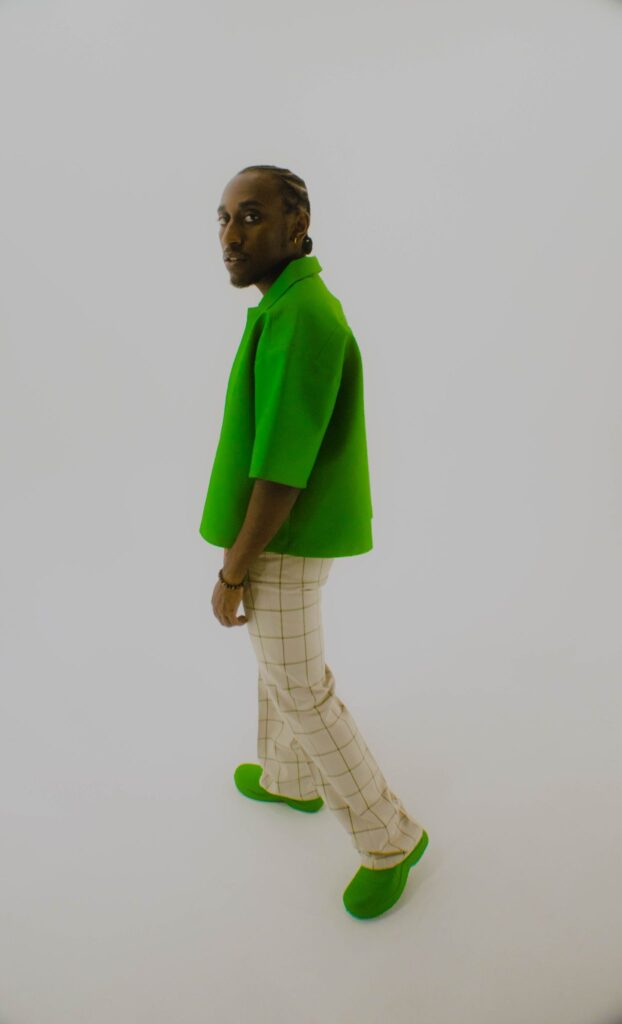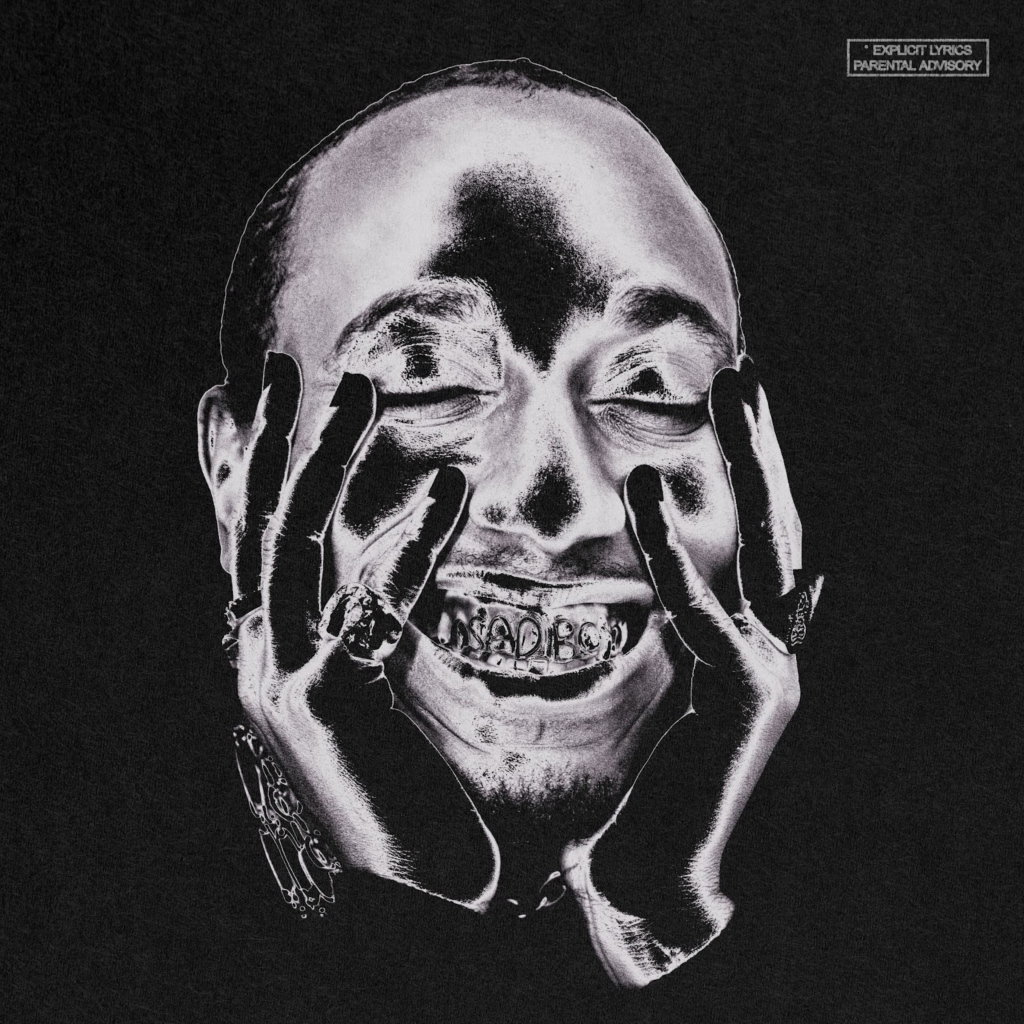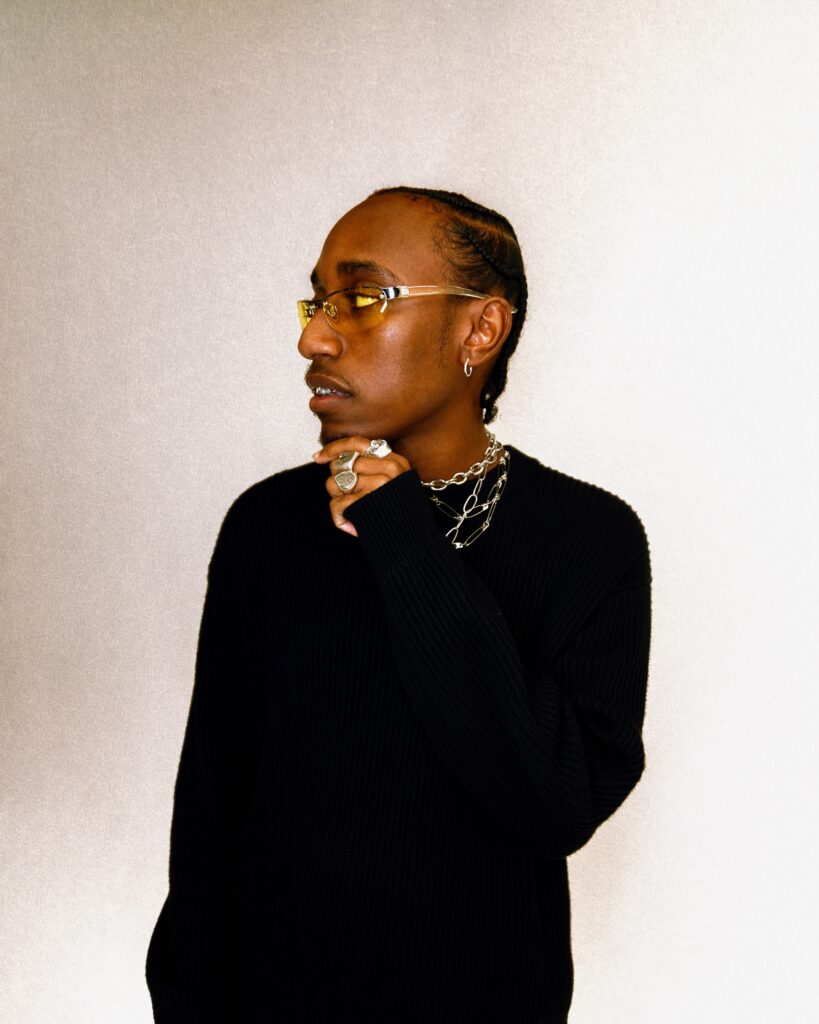Reggie Becton doesn’t just endure uncomfortable situations; he thrives in them.
“I’m really big on discomfort and how it allows you to push past your own limitations,” Becton tells Rated R&B on a sunny April afternoon over Zoom. He’s reminiscing on his bold decision to relocate from Prince George’s County, Maryland, to Los Angeles, California, to pursue his music career.
“For me, it was more so that I knew that if I went back home, I would’ve had distractions. It was really a decision to be like, ‘All right, if I want to go for it, I’ll need to be in the best area to go for it, which is LA; there’ll be less distractions there. If I’m a thousand miles from home, I have no choice but to grind,’” he shares.
Becton grew up in Fort Washington, Maryland, and attended school in Washington, D.C. Coming from a close-knit family, music from various genres was always playing in the house.
His sister, a big Brandy fan, frequently played songs from other ‘90s R&B stars, such as Usher and Destiny’s Child. “I remember my sister playing Destiny’s Child’s The Writing’s on the Wall album all day, every day. Now, I have it on CD — I got it from a record store — and have it in my car and listen to it often.”
His parents also had their own distinct musical tastes: “My mom was very much into gospel, like Trin-i-Tee 5:7 and artists like that. My dad was very much into rock and soul.”
When asked about his biggest influence, Becton cites go-go music, a subgenre of funk that originated in Washington, D.C., as a crucial component of his sonic identity. “I think with go-go being so multifaceted and a melting pot of different genres — it’s rock, it’s jazz, it’s soul, it’s hip-hop — that kind of opened my eyes to all types of music,” he explains.
Becton’s eclectic musical palette shines brightly on his latest EP, Sadboy, Vol. 1, out now. With R&B at its core, Becton masterfully blends of drill (“Streets”), reggae (“Life”) and acoustic soul (“Lettin’ Go”), among other stylings, to create a multidimensional world where he explores and unpacks the depths of sadness, as it relates to love.
Sadboy, Vol. 1 is the first of a two-part EP series, serving as an intermediary project before the release of his sophomore album, the follow-up to his debut album, California, released in 2021. Becton says Sadboy was initially going to be a rock-inspired project, which came about during jam sessions in the studio.
“I didn’t know what I was making at the time. We just started making music. I wanted to wait to make a second album. I didn’t want to go directly into that, but I was enjoying some of the music we were creating. Then, me and my executive producer Aidan Carroll started to talk about some things. Sadboy was almost gonna be like this rock album, similar to how Summer Walker does CLEAR, where it’s an EP with four songs. We started to work on it, and I was just like, ‘I don’t know if this is where my heart is right now.’ So we said, ‘F*ck it, let’s just record and make what we make.’”
As Becton continued to record more music, he gained a better understanding of the direction he wanted to take. “It became clear that this is the music I want people to feel. When I started conceptualizing the project, I chose the songs that evoke great feelings for me.”
In Rated R&B’s interview with Reggie Becton, the singer/songwriter talks more about Sadboy, Vol.1, managing his mental health, his experience working with Alex Vaughn and Rodney Jerkins, and more.

At what point did you know that you wanted to pursue a career in music?
I always knew that I love music. Singing was my first love. Around middle school, I started songwriting, and that’s what really opened my eyes to a different part of music. That intrigued me more to really figure out how to construct songs. By high school, I knew for sure that I wanted to be an artist.
Your SoundCloud bio states that you found your sound in Philadelphia. In what way?
I say I found my sound there because at Temple [University],and made music for myself. I wasn’t releasing music or anything. I think that allowed me to find my way as an artist, who I wanted to be and what my sound was.
What’s the inspiration behind Sadboy ,Vol. 1?
There’s always this running joke about my music on social media or after shows. One fan came up to me and said, ‘It was really painful to watch because the way you write about love is so heartbreaking and sad.’ That compliment always stayed with me because I enjoyed the fact that my music struck a chord with her, even if it was sadness. As we started writing it, one of the lines in “Streets” is: “I’m tired of feeling sad.” So it was this sadness theme, and I was like, “Okay, what if I call this Sadboy?” I’m a big fan of Marvel and comic books, so I felt like it was a time when I could build a world out. We came up with this idea to do a short series/film to pair this project, inspired by TV and films like Kill Bill and The Dark Knight. That heavily dictated how Sadboy and its sound came to be.
When you were creating this Sadboy world, how easy was it for you to be more open and allow others in?
With every project, I want to become more vulnerable [and] get to that space of ultimate vulnerability. Prince and Marvin Gaye, two of my biggest inspirations, were very vulnerable. Prince was vulnerable on every level — from his look to his sound to his performances. His authenticity, his rawness and being unapologetically himself — that’s where I’m trying to make music for, especially men, to get us in a more vulnerable space and confront our emotions. When I approach it from a songwriter standpoint or even a vocal delivery standpoint, it’s always like, “What’s the intentionality behind these words? What am I trying to get across? How do I want my audience to feel when listening to this?” It has to be honest. I think with Sadboy, I reached a place where I was having fun [and] that made me more comfortable and expressive of everything I was feeling at the time in some of these songs.
You open Sadboy with the title track. What’s the significance behind that song since you named the project after it?
The title track feels like a theme song. I think that’s why we titled this Sadboy. Going back to this Marvel-type universe, it feels like the villain’s origin story. It’s what has made me sad. The song is this melting pot of every relationship I’ve ever been in, where it always feels like we get to this point, and it just all goes bad. I think that’s why “Sadboy” encompassed the whole project. When we were making it, we always played around with the term like, “Oh, we are making R&B for Gotham City.” I feel we nailed it.
You’ve always released your projects in the fall. What inspired the change of season?
Fall has always been the season for a Reggie Becton project. We wanted [Sadboy] to come out in the fall, but it just didn’t feel right. I wanted to change some songs, so we delayed it. We also wanted to shoot the short film before it came out. Spring made the most sense because the short series is kind of in that place of summertime. We started to think about the timing of it. I always felt like darker music was made for the fall. But I was like, “Hmm, let’s put darker music out while everybody is trying to make summer jams [and] party anthems. Why not directly speak to the people who may be going through some shit in the spring or summer?” Sometimes those can be the most depressing times for people.

The cover art of Sadboy is an inverted photo of you smiling. What’s the inspiration behind that?
I love a good juxtaposition. I feel like emotions are these things that we try to make so much into one thing. We try to make them so constant. Sadness shows up in our lives in so many different ways. Sometimes you’re sad because of a breakup; sometimes you’re sad because you had great sex with someone and you can’t get that feeling back. It’s not always a sadness where you’re moping on the couch; it’s a sadness you feel. For Sadboy, I wanted to redefine sadness in a way that appears in my life.
Sadboy, Vol. 1 is the first of two parts. How would you compare Vol. 1 to Vol. 2?
Vol. 1 is about the sadness you feel from all your past relationships and trying to use those relationships to better yourself. Vol. 2 is you’ve worked through some of your emotions, and now you feel you’re in a place to give love to someone and attract love, but you’re unable to find someone to give that love to. I’m hoping the sound of Vol. 2 will be a little lighter.
How do you cope with sadness as an artist?
That’s something I’m working on now; it’s a multitude of things. Sometimes it’s eating chocolate, going to a bar, rolling some weed, or calling my managers to watch a movie or something. Sometimes, I just need to get out outside. Lately, that’s been the cure for me. A big part of the sadness that I’ve been feeling is just sadness from new levels, new devils. There’s a lot of things coming my way — all good things that I’m excited about — but I’m getting stressed. I still work a 9-5, so there’s duality of me trying to appear and do my best there, but also trying to make my exit. My boss is nice, and I know they need me, but I need to leave them. All these things at play really got me in a bit a funk. What’s been helpful is getting a lot more rest. I really value my rest now.
What’s the inspiration behind “Lettin’ Go”?
The tricky thing about “Lettin’ Go” is it puts you in this vibe of sun shining and fun. But when we wrote that song, we were like, “Let’s craft the most beautiful breakup song ever.” So if you listen to the words, it’s probably one of the sadder songs on the project. We wanted to create something that didn’t feel sad, but, lyrically, was one of the most gut-wrenching songs.

You co-wrote three songs on Alex Vaughn’s The Hurtbook EP, including the Darkchild-produced tracks “So Be It” and “Do You Ever” and “Demon Time.” How did you two DMV natives connect?
We met on set of my “Issues” video through a mutual friend. We’ve known each other from just seeing each other out. We never saw each other in PG County, but we are from PG County. We’ve always had this mutual respect for each other. When she came to the “Issues” video shoot, we got time to chop it up and became cool. After that, I got a call to go write some songs with Rodney Jerkins from my A&R at Universal [Music Group], Lauren Kennedy — and it was for Alex Vaughn.
What was your experience like working with the legendary Rodney Jerkins?
He’s like my all-time favorite producer because [Brandy’s] Full Moon is my favorite album of all time. He embraces all creativity. He gave us the liberty to create. It was cool because he also guided us every step of the way. He also provided honest feedback. It was like a master class. It was also cool to see someone still perform in their highest regard of music and then prioritize family. There were days where he was like, “I’m leaving at this time to hang with my family.” It was cool to see that you can reach a place where once you’ve paid your dues and built your name, you can reach a point where it’s like, “All right, I can do music from nine to five, and then can go home, be with my family and have that balance.”
Was there anything from your experience working with Rodney Jerkins that you applied going forward with your music?
He never was formulaic in the process. A lot of times when people are trying to make a hit or strong records, they get very formulaic. What he honestly wanted every time was, “Y’all need to be having conversations. Before you write any of these songs, have the conversation, and talk about it.” Like, “Take a dive deep into the psyche of everything you guys are going through.” For “So Be It,” we talked for maybe two or three hours before we even started writing that song. “So Be It” was the song we wrote on the first day.
Do you plan on writing more songs with other artists?
I’ve been doing a lot. I wrote a lot for Tone [Stith], so hopefully something makes it on that project. I did some stuff with Eli [Derby], and other people that I’m not gonna say yet. I’m excited that I get to do that more.
What do you want listeners to take away from Sadboy?
I want people to become more comfortable with their emotions and embrace them. With sadness being such a big theme of this project, I want people to realize that sadness is not just this dark emotion. Sadness is colorful like any emotion, and it’s okay to be sad. I want people to feel like these songs are soundtracks of their lives. I wanted to create music for men going through breakups, heartbreaks [or] having a hard time trying to find love. I feel like a lot of men out here are dying to be loved, but just too afraid to say it.
Stream Reggie Becton’s Sadboy, Vol. 1 EP below.